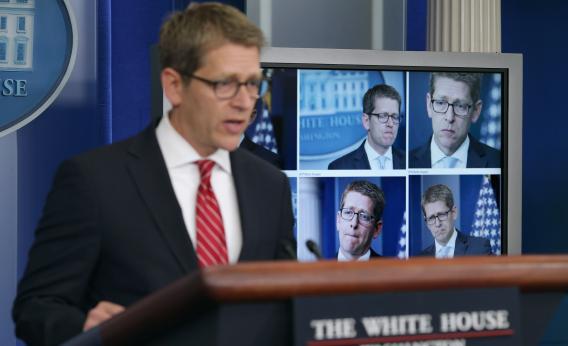At the lower, grittier levels of politics, it’s an established fact: Barack Obama is responsible for the IRS hassling Tea Party groups. Republican campaign organizations have drawn a straight line from Obama’s complaints about giant 501(c)(4)s and (c)(3)s to the IRS’ follow-up questions to tiny applicants. At this weekend’s Virginia GOP convention, the party’s nominee for attorney general accused the president of masterminding the whole shebang. “Mr. President,” said state Sen. Mark Obenshain, “the next time you have the IRS target the Virginia Tea Party, you’re gonna have to deal with me.”
But when you get away from the news cycle and the Narrative Factory, it’s harder to find ties between Obama and the IRS. Score one for Republicans: The White House’s insistence that Obama learned of every scandal “by reading the news” has become a punchline. But, frustratingly, they haven’t proved the smug guys wrong. There are, basically, two potential scandals about when the White House should have known about “Tea Party targeting.”
They knew before the election! That’s the most damaging possible scandal—the White House knew about the IRS’ slow-walking of Tea Party applications and failed to act out before the election. If the administration knew, maybe it covered up the story! But the sad, stupid truth is that the targeting was being reported on as long as 15 months ago, when Roll Call’s Janie Lorber picked up the story. Republicans discussed it from time to time. “I’ve been talking about this since June of 2012,” said Mitch McConnell last week in an interview with Hugh Hewitt. “There were Tea Party groups in my state complaining about this back then.”
Why didn’t anything come from this? Reporters (myself included) didn’t follow up. Republicans didn’t make a great fuss about it—and one of the frequent failures of the political press is that it doesn’t see the heat on a story until one party complains.
They knew before last week! That’s the scandal birthed by this story by Peter Nicholas, who reports that the White House counsel was informed of the basics of the IRS investigation on April 22. Nailing a White House on when it learned of a scandal is a time-tested tradition. In May 2011, Eric Holder said he’d “probably heard about Fast and Furious for the first time over the last few weeks.” He’d gotten memos about the scandal for months.
The White House has adapted and learned. Here’s how Jay Carney handled a “timing” question last week.
Q: I want to follow up on the IRS. I still don’t quite understand the timeline. We had members of Congress complaining about this for two years. Did it just never reach you guys here at the White House that there was these complaints that conservative groups felt that they were being singled out and targeted at any point in time?
MR. CARNEY: I’m not sure that people – I’m sure people were aware of and knew some of the stories that had been reported about the complaints, but we were not aware of any activity or of any review conducted by the Inspector General until several weeks ago.
Several weeks? April 22? Close enough, probably. That leaves us with the theoretical scandal—maybe Obama’s rhetoric convinced the IRS to go buck wild on the Tea Party!—as the best kindling for Republican activists.
